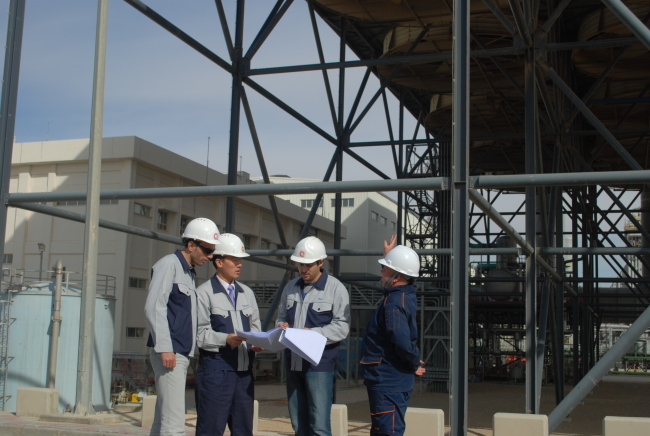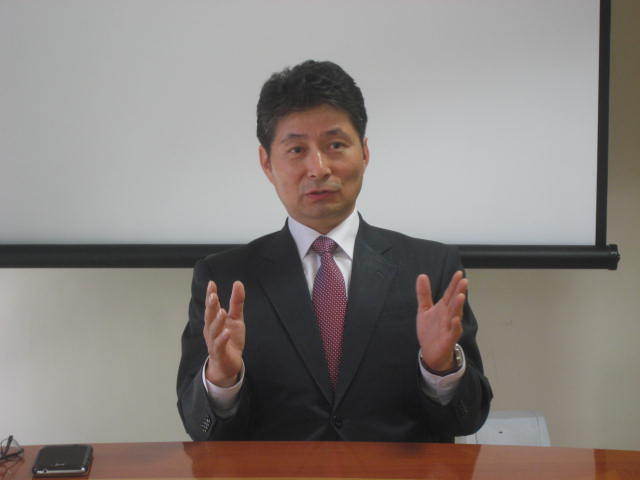KEPCO powers its way into Middle East market
Jordan takes on the role of strategic hub for KEPCO’s power biz expansion in the region
By Korea HeraldPublished : Nov. 27, 2013 - 19:45

AL QATRANA, Jordan ― The state-run Korea Electric Power Corp. is using its diversified business portfolio to further its decade-long effort to penetrate the Middle East power market.
KEPCO-led power plant projects in the Middle East include gas, nuclear power and renewables.
“KEPCO is building a reputation as a reliable independent power provider in the region, based on its success in Jordan,” Yun Seok-bae, CEO of Qatrana Electric Power Co., told The Korea Herald.
KEPCO-led power plant projects in the Middle East include gas, nuclear power and renewables.
“KEPCO is building a reputation as a reliable independent power provider in the region, based on its success in Jordan,” Yun Seok-bae, CEO of Qatrana Electric Power Co., told The Korea Herald.

QEPC is a joint venture between KEPCO and Saudi Arabia-based Xenel Industries, which was launched in 2009 to lead the Al Qatrana project, after the KEPCO-led consortium won the project on a build-own-operate basis in 2008.
“The Jordanian power project was the first deal that the KEPCO-led consortium won in the Middle East,” Yun said. The deal was sealed a year ahead of KEPCO’s historic nuclear power plant construction and operation deal with Abu Dhabi, UAE, in 2009.
KEPCO holds an 80 percent stake in QEPC, while Xenel has the remaining 20 percent. QEPC implemented the first phase of the deal by completing construction of the 373-megawatt gas-powered plant in Al Qatrana, 90 kilometers south of Amman, in February last year. The company will supply power to Jordan by 2035 under a 25-year power purchase agreement made by Jordan’s National Electric Power Co.
“The power purchase agreement means KEPCO has secured a stable income source over the long term,” Yun said, adding that KEPCO expects to draw $10.9 million per year on average for the next 25 years from the operation of the Al Qatrana plant.
“The successful launch of the Al Qatrana power plant, which will provide 11 percent of Jordan’s total power generation capacity, laid the foundation for KEPCO to win a second build-own-operate power deal in Jordan called the ‘IPP 3 project’ last year,” Yun said.
Under the contract with the Jordanian government, another KEPCO-led consortium started construction of a 573-megawatt diesel internal combustion power plant in Al Manakher, Jordan, in April. Japan’s Mitsubishi joined the project with a 40 percent stake.
“If the $800 million plant starts operation after the completion of construction in the latter part of next year, KEPCO will emerge as the No. 2 power supplier in Jordan, after CEGCO,” Yun said.
KEPCO also entered the renewable energy market in Jordan early this year when it landed a $187 million deal with Jordan’s Ministry of Energy and Mineral Resources to build a 90-megawatt wind power plant in Fujeij.
“Jordan is strategically important for KEPCO, in that it is politically stable and surrounded by KEPCO’s next target markets, including Iraq and Syria,” Yun said.
KEPCO has placed its interest in emerging Middle East markets since the advanced economies, most of which are member nations of the Gulf Cooperation Council, are too competitive.
“KEPCO is expecting our business ventures in Jordan to play a bridging role for entering those markets when their political situations improve in the future,” Yun said.
By Seo Jee-yeon, Korea Herald correspondent
(jyseo@heraldcorp.com)
“The Jordanian power project was the first deal that the KEPCO-led consortium won in the Middle East,” Yun said. The deal was sealed a year ahead of KEPCO’s historic nuclear power plant construction and operation deal with Abu Dhabi, UAE, in 2009.
KEPCO holds an 80 percent stake in QEPC, while Xenel has the remaining 20 percent. QEPC implemented the first phase of the deal by completing construction of the 373-megawatt gas-powered plant in Al Qatrana, 90 kilometers south of Amman, in February last year. The company will supply power to Jordan by 2035 under a 25-year power purchase agreement made by Jordan’s National Electric Power Co.
“The power purchase agreement means KEPCO has secured a stable income source over the long term,” Yun said, adding that KEPCO expects to draw $10.9 million per year on average for the next 25 years from the operation of the Al Qatrana plant.
“The successful launch of the Al Qatrana power plant, which will provide 11 percent of Jordan’s total power generation capacity, laid the foundation for KEPCO to win a second build-own-operate power deal in Jordan called the ‘IPP 3 project’ last year,” Yun said.
Under the contract with the Jordanian government, another KEPCO-led consortium started construction of a 573-megawatt diesel internal combustion power plant in Al Manakher, Jordan, in April. Japan’s Mitsubishi joined the project with a 40 percent stake.
“If the $800 million plant starts operation after the completion of construction in the latter part of next year, KEPCO will emerge as the No. 2 power supplier in Jordan, after CEGCO,” Yun said.
KEPCO also entered the renewable energy market in Jordan early this year when it landed a $187 million deal with Jordan’s Ministry of Energy and Mineral Resources to build a 90-megawatt wind power plant in Fujeij.
“Jordan is strategically important for KEPCO, in that it is politically stable and surrounded by KEPCO’s next target markets, including Iraq and Syria,” Yun said.
KEPCO has placed its interest in emerging Middle East markets since the advanced economies, most of which are member nations of the Gulf Cooperation Council, are too competitive.
“KEPCO is expecting our business ventures in Jordan to play a bridging role for entering those markets when their political situations improve in the future,” Yun said.
By Seo Jee-yeon, Korea Herald correspondent
(jyseo@heraldcorp.com)
-
Articles by Korea Herald









![[KH Explains] Hyundai-backed Motional’s struggles deepen as Tesla eyes August robotaxi debut](http://res.heraldm.com/phpwas/restmb_idxmake.php?idx=644&simg=/content/image/2024/05/16/20240516050605_0.jpg&u=20240516155018)









